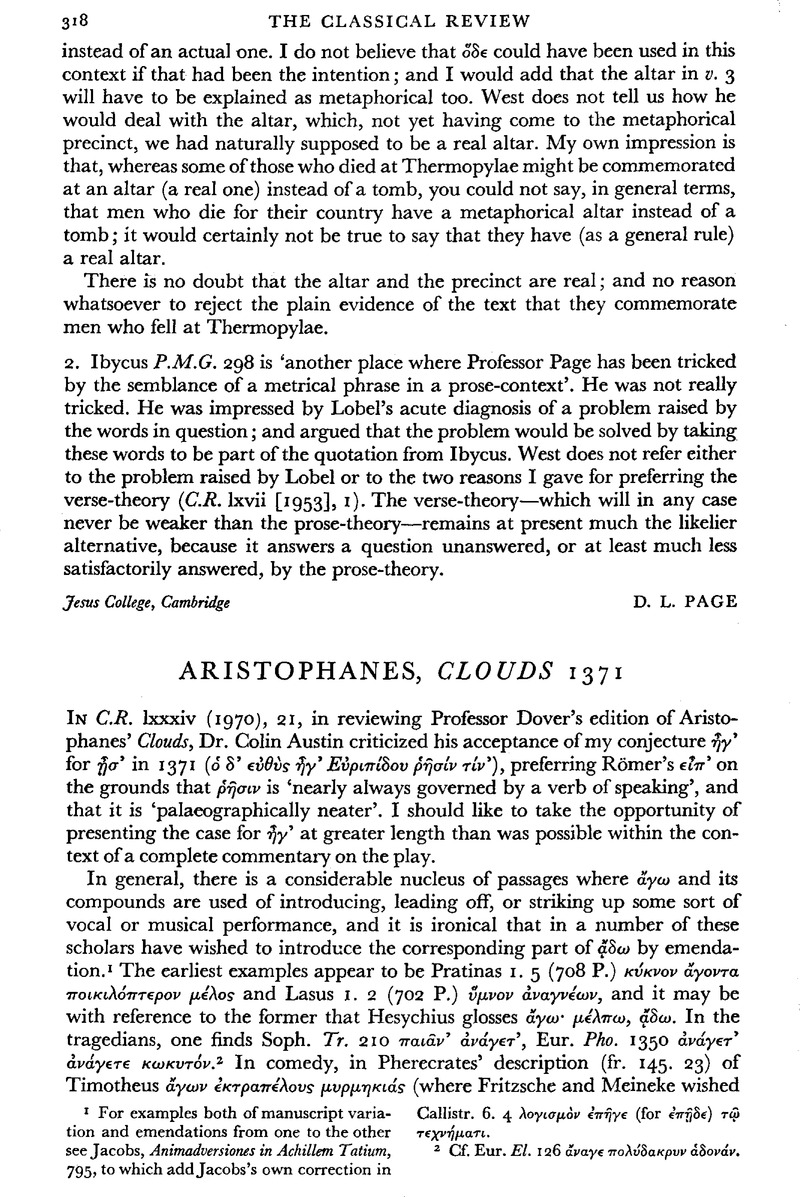No CrossRef data available.
Published online by Cambridge University Press: 27 February 2009

page 318 note 1 For examples both of manuscript variation and emendations from one to the other see Jacobs, Animadversiones in Achillem Tatium, 795, to which add Jacobs's own correction in Callistr. 6. 4 λογισμ⋯ν ⋯π⋯γε (for ⋯π⋯δε) τῷ τεχν⋯ματι.
page 318 note 2 Cf. Eur. El. 126 ἄναγε πολ⋯δακρυν ⋯δον⋯ν
page 319 note 1 Trag. fr. adesp. 395 κακ⋯ν κατ⋯ρχειςτ⋯νδε μο⋯σαν εἰσ⋯γωνmay be comparable: certainly κατ⋯ρχω has the sense of starting off a piece of music or the like—cf. Eur. Andr. 1199, Hec. 685, H.F. 750, 891, Or. 960,and especially Arist. Mu. 399a15.
page 319 note 2 εἰσ⋯γει ῥ⋯σιν occurs in Athen. 453 f. in a slightly different sense.
page 319 note 3 I owe the identification to Dr. R. G. Ussher.
page 319 note 4 Sheppard's interpretation of ἄγων assumes a sense of motion in παρ⋯ π⋯τον, which however is not required: cf. Xen. An. ii. 3. 15, Conv. viii. 41—over wine, L.S.J.
page 319 note 5 Pheidippides had already (1358) contemptuously rejected his father's invitation to sing. Although Webster, T. B. L. (The Tragedies of Euripides, 159)Google Scholar refers to the ‘singing’ of the prologue speech of the Aeolus, quoting also Suet. Nero 21 cantavit Canacen parturientem as evidence for singing of even non-lyric parts of tragedy, one notices that translators of the Clouds tend to avoid the true meaning of ᾖσ', which they read in 1371, e.g. ‘he began the shameful tale’ (Rogers), ‘then he commenced a piece’ (Athenian Society translation), ‘Pheidipides … would do nothing but recite a scandalous speech of Euripides' (Harriott, B.I.C.S. ix ‘1962’, 4). If, as Webster surmises (op. cit. 158), the prologue speech by the nurse (?) which proclaimed the incest of Canace and Macareus is the rhesis which Pheidippides began, it is unlikely to have had any very notable lyrical quality about it. There is one later and doubtful piece of evidence for singing of a Euripidean rhesis, in Luc. Hist. Conscr. 1 (v.l. μ⋯λει) διεξῄεσαν, and the second of the Oslo musical fragments (Fragments of New Tragic Texts with Musical Notation, ed. Eitrem, Amundsen, Winnington-Ingram), shows that musical settings of tragic trimeters were made about Lucian's time. But Lucian himself (Salt. 27 ⋯νι⋯τε κα⋯περιᾴδων τ⋯ ἰαμβεῖα) regards this as a perverse practice; the probable reading is in fact ⋯ν μ⋯ρει (cf. Symp. 17), and in any case this is not relevant evidence for the time of Aristophanes.
page 319 note 6 e.g. Theoph. Char. 15. 10 οὔτε ᾄσαι οὔτεῥ⋯σιν εἰπεῖν.